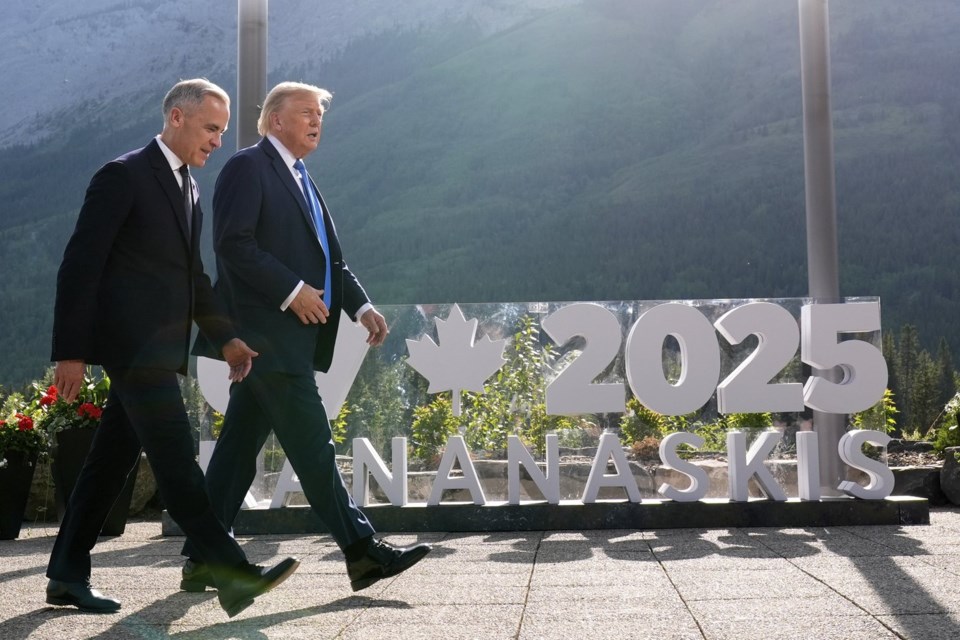OTTAWA — Some small Indigenous businesses are halting shipments to the U.S. in the wake of President Donald Trump's tariff regime, even though trade ties exist that predate the founding of both Canada and the United States.
"There needs to be a resolution to allow Indigenous Peoples to continue to undergo the trade routes that they have established and practised, and the treaties that have been signed in the past have suggested that these would be honoured," said Matthew Foss, who serves as the vice president of research and public policy at the Canadian Council for Indigenous Businesses.
"It's up to the federal governments in Canada and the United States to figure out how to honour those."
Trump announced last month his government was going to suspend duty-free de minimus imports from all countries, with the new rules set to come into effect last Friday — part of his government's larger push to promote domestic business development.
Purchases that previously entered the U.S. valued under $800 without needing to clear customs will require vetting and be subject to their origin country’s applicable tariff rate, which can range from 10 to 50 per cent. For the next six months, carriers handling orders sent through the global mail network also can choose a flat duty of $80 to $200 per package instead of the value-based rate.
Foss said Indigenous craftworks are exempt from tariffs under the current Canada-U.S.-Mexico trade agreement, but the documentation needed to secure that exemption may be too cumbersome for a small business to handle. He is lobbying the federal government to address those administrative burdens, but "it's not moving quickly."
Stevi Riley, who lives in Walpole Island First Nation and operates The Beaded Hero, said around half of her orders come from the U.S. She made the decision to stop all sales in that country due to the new import rules, but worries about the impact that cutting her business off from that market will have.
"I just felt discouraged," Riley said of the changes that could see a 35-per-cent increase in the cost to ship across the border.
"If you (the U.S.) don't want Canadian products going over, I don't want to deal with it. I don't want things getting destroyed or things getting sent back, and I feel like that's going to happen."
Tribal Spirit Drums and Music, based in Ivry-sur-le-Lac, Que., posted on social media they would be halting U.S.-based sales as of Aug. 27, citing the de minimus changes, as did Dominique O'Bonsawin, who runs Cedarlilie Beads.
"It definitely means less reach, which is a bummer because the U.S. would be a huge opportunity for growth," said O'Bonsawin.
"Not being able to trade freely creates more distance and barriers for rebuilding relationships with communities in the U.S. We are related and connected, and this is frustrating."
The Trump administration says the exemption has become a loophole that foreign businesses exploit to evade tariffs and criminals use to get drugs, counterfeit products and other contraband into the U.S.
Former President Joe Biden and members of Congress also discussed the issue.
Jack Royal, who serves as the chairman and CEO of the Indigenous Businesses Corporation, said in an interview there is a lot of uncertainty in the U.S.-Canada relationship, and that it's causing instability for Indigenous businesses and Canadians alike.
"Like other small businesses, what First Nations are looking for is some certainty and to look for support on how we can maximize our other options," he said.
Twenty-five countries have already suspended postal services to the U.S., according to the Universal Postal Union.
"These suspensions will remain in place pending further information on how U.S. authorities will operationalize these measures as well as actual implementation of the required operational changes," the UN agency said in a news release last week.
Canada Post has not suspended exports, but has informed some business owners it is working to "understand the order, assess options, and secure solutions that will ensure we can maintain continuity for your business."
Foss said the Canadian Council for Indigenous Businesses has been regularly engaging with the Canada Trade Commissioner Service to work on solutions to cross-border trade with Indigenous businesses, and is encouraging Indigenous leaders to advocate for the re-establishment of rights.
The Assembly of First Nations annual general meeting in Winnipeg this week has a series of resolutions up for debate, including on cross-border trade.
One resolution, brought forward by Chief Roger Redman of Standing Buffalo First Nation, is calling for the advocacy body to help fund a legal opinion on Aboriginal and treaty rights to cross-border trade, and for the AFN to urge the federal government to include First Nations in all negotiations related to tariffs and trade policies.
O'Bonsawin said the U.S. and Canada have historically had strong trade agreements, and hopes things can "go back to normal" soon.
"I don't see anything being done in the near future unfortunately, but I'm hopeful the next U.S. administration will do better for Canada and the U.S."
— With files from The Associated Press
This report by The Canadian Press was first published Aug. 31, 2025.
Alessia Passafiume, The Canadian Press




